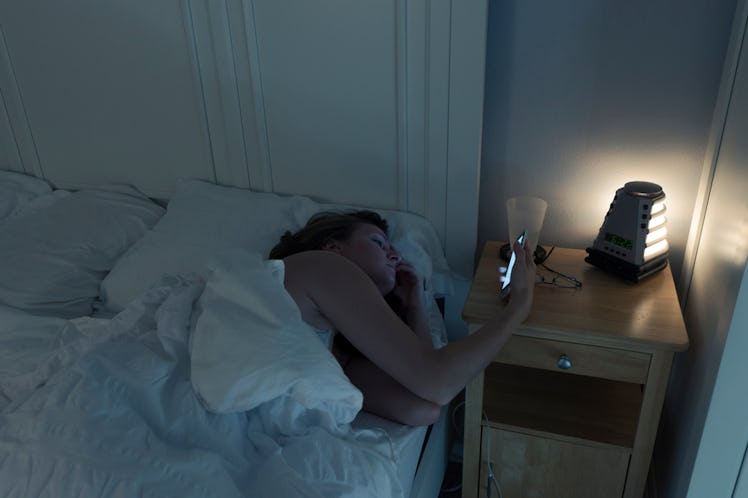
These Hacks Stop You From Oversleeping & They're All Backed By Science
When you're juggling work, friends, and a generally packed week of activities, oversleeping is the last thing you need to happen to you. The problem is it feels so d*mn good at the time; those additional 10-minute increments of sleep that you get with each press of the snooze button always come back to bite you. Sleeping through your alarm can cause you to miss your workout, be late to a meeting, or generally start your day on the wrong foot. But here's the good news: There are easy ways to learn how to stop oversleeping — that is, if you're willing to part with all those snooze sessions.
One of the main problems that contributes to oversleeping is a general lack of sleep to begin with. If you're going to sleep around midnight every night, then your body will most likely want to sleep until at least 8 a.m. to get those seven to eight hours of sleep the average person needs. The best thing you can do is try to go to sleep earlier, so that your body feels well-rested by your actual wake-up time.
But if that's not working, there are plenty of other ways to hack your wake-up routine. Here are five easy ways to never oversleep again, all backed by science.
01Consider Ditching Your Alarm Clock
If you already have an alarm clock, and it doesn't do a damn thing to help you stop oversleeping, consider not relying on it altogether. I know it seems like an impossible feat, but you can train your body to wake up without an alarm. It basically comes down to sticking to a legit schedule every night and every morning, falling into the right rhythm, and avoiding late-night sleep times. Soon, the routine will take shape, and you'll no longer have to rely on a loud ringing noise to get you up each day.
02If You Insist On The Alarm, Get An Old School One
Sonic Alert Sonic Bomb Loud Dual Alarm Clock With Bed Shaker, $29.56, Amazon
If you're someone who basically cannot go about your daily life at all without an alarm clock to wake you up in the morning, try choosing an old school one that you literally cannot snooze through. A loud noise is one of the most immediate ways to trigger your nervous system to wake up, and what better way to wake up than with a bolt of massive adrenaline, right?
Personally, this kind of sounds like hell on Earth, but I have tons of friends who refuse to wake up for anything that isn't miserable to listen to. It most definitely will ensure your eyes are open, so there's that.
03Remember Your REM Cycle
Your REM cycle — a sleep stage that makes up about a quarter of your total sleep cycle in a night — lasts for about 90 minutes, so trying to make sure that your sleep duration is a multiple of 90 minutes will help you wake up at a lighter sleep stage. If you wake up in one of the deeper stages of your sleep cycle, it can leave you feeling totally disoriented and groggy, which definitely won't help you stop oversleeping.
04Be Consistent With Your Wake-Up Time
Routine, routine, routine. If you're trying to establish an end to your oversleeping problem, then it'll help if you wake up around the same time every day, and yes, that would ideally include weekends, too.
Getting good, sufficient sleep is a marathon game, not a sprint. It helps your body most when you work on falling asleep around the same time every night, getting at least seven hours, then waking up at a predictable time in the morning.
05Download An App That Guarantees You Won't Oversleep
There are some pretty fancy, science-based wake-up apps out there, just waiting to help you greet the day each morning.
Some apps, like this one called Alarmy, force you to complete a puzzle before they turn off, thus guaranteeing that you're fully awake before falling back asleep. Then there's the app called Alarm Clock for Heavy Sleepers, which allows you to customize your morning wake-up routine with music and multiple alarm styles, from the gradual wake-up option to the smack-you-awake option.